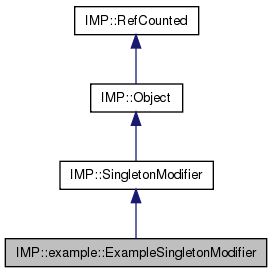A simple singleton modifier which restrains the x,y,z coordinates to a box by wrapping them.
Such a class could be coupled with an IMP::core::SingletonRestraint or IMP::core::SingletonsRestraint to keep a set of particles in a box.
import IMP.example
import IMP.core
import IMP.container
bb= IMP.algebra.BoundingBox3D(IMP.algebra.Vector3D(0,0,0),
IMP.algebra.Vector3D(10,10,10))
m= IMP.Model()
ps= IMP.core.create_xyzr_particles(m, 20, 1)
sc= IMP.container.ListSingletonContainer(ps)
ss= IMP.container.SingletonsConstraint(sc, IMP.example.ExampleSingletonModifier(bb), None)
m.add_score_state(ss)
# now optimize and things
The source code is as follows:
/** * \file example/ExampleRestraint.h * \brief A restraint on a list of particle pairs. * * Copyright 2007-2010 IMP Inventors. All rights reserved. * */ #ifndef IMPEXAMPLE_EXAMPLE_RESTRAINT_H #define IMPEXAMPLE_EXAMPLE_RESTRAINT_H #include "example_config.h" #include <IMP/SingletonScore.h> #include <IMP/Restraint.h> #include <IMP/PairContainer.h> #include <IMP/PairScore.h> IMPEXAMPLE_BEGIN_NAMESPACE //! Apply a PairScore to a list of particle pairs /** This restraint could be used, in conjunction with a ClosePairsScoreState and a SphereDistancePairScore, to prevent particles from interpenetrating. \note Be sure to check out the swig wrapper file and how it wraps this class. The source code is as follows: \include ExampleRestraint.h \include ExampleRestraint.cpp */ class IMPEXAMPLEEXPORT ExampleRestraint : public Restraint { /** IMP::Objects should be stored using Pointer objects to make sure that they are reference counted properly. */ Pointer<PairContainer> pc_; Pointer<PairScore> f_; public: //! Create the restraint. /** Restraints should store the particles they are to act on, preferably in a Singleton or PairContainer as appropriate. They should also take a score function or a UnaryFunction allowing the form of the scoring function to be changed. */ ExampleRestraint(PairScore* score_func, PairContainer *pc); /** This macro declares the basic needed methods: evaluate and show */ IMP_RESTRAINT(ExampleRestraint); }; IMPEXAMPLE_END_NAMESPACE #endif /* IMPEXAMPLE_EXAMPLE_RESTRAINT_H */
/** * \file example/ExampleRestraint.cpp * \brief Restrain a list of particle pairs. * * Copyright 2007-2010 IMP Inventors. All rights reserved. * */ #include <IMP/example/ExampleRestraint.h> #include <IMP/PairScore.h> #include <IMP/log.h> IMPEXAMPLE_BEGIN_NAMESPACE ExampleRestraint::ExampleRestraint(PairScore* score_func, PairContainer *pc) : pc_(pc), f_(score_func) { pc_->set_was_used(true); f_->set_was_used(true); } double ExampleRestraint::unprotected_evaluate(DerivativeAccumulator *accum) const { double score=0; for (PairContainer::ParticlePairIterator it= pc_->particle_pairs_begin(); it != pc_->particle_pairs_end(); ++it) { score += f_->evaluate(*it, accum); } return score; } /* Return a list of interacting sets. The PairScore defines the interactions so defer to it.*/ ParticlesList ExampleRestraint::get_interacting_particles() const { ParticlesList ret; for (PairContainer::ParticlePairIterator it = pc_->particle_pairs_begin(); it != pc_->particle_pairs_end(); ++it) { ParticlePair pp= *it; ParticlesList all=f_->get_interacting_particles(ParticlePair(pp[0], pp[1])); ret.insert(ret.end(), all.begin(), all.end()); } return ret; } /* We also need to know which particles are used (as some are used, but don't create interactions). */ ParticlesTemp ExampleRestraint::get_input_particles() const { ParticlesTemp ret; for (PairContainer::ParticlePairIterator it = pc_->particle_pairs_begin(); it != pc_->particle_pairs_end(); ++it) { ParticlePair pp= *it; ParticlesTemp t= f_->get_input_particles(pp); ret.insert(ret.end(), t.begin(), t.end()); } return ret; } ContainersTemp ExampleRestraint::get_input_containers() const { return ContainersTemp(1, pc_); } void ExampleRestraint::do_show(std::ostream& out) const { out << "function " << *f_ << std::endl; out << "container " << *pc_ << std::endl; } IMPEXAMPLE_END_NAMESPACE

Public Member Functions | |
| void | apply (const ParticlesTemp &ps, DerivativeAccumulator &) const |
| void | apply (const ParticlesTemp &ps) const |
| void | apply (Particle *a, DerivativeAccumulator &) const |
| void | apply (Particle *a) const |
| ExampleSingletonModifier (const algebra::BoundingBoxD< 3 > &bb) | |
| ContainersTemp | get_input_containers (Particle *) const |
| ParticlesTemp | get_input_particles (Particle *) const |
| ParticlesList | get_interacting_particles (Particle *) const |
| ContainersTemp | get_output_containers (Particle *) const |
| ParticlesTemp | get_output_particles (Particle *) const |
| virtual std::string | get_type_name () const |
| virtual ::IMP::VersionInfo | get_version_info () const |
Friends | |
| template<class T > | |
| void | IMP::internal::unref (T *) |